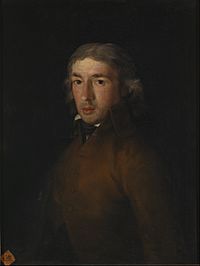Leandro Fernández de Moratín facts for kids
Quick facts for kids
Leandro Fernández de Moratín
|
|
|---|---|

Moratín painted by Goya
|
|
| Born | 10 March 1760 |
| Died | 21 June 1828 (aged 68) |
| Resting place | Pantheon of Illustrious Men |
| Occupation |
|
Leandro Fernández de Moratín (born March 10, 1760 – died June 21, 1828) was a famous Spanish writer. He was a playwright, a translator, and a poet who followed the neoclassical style. This means his work was inspired by the art and ideas of ancient Greece and Rome.
Contents
Life and Early Works
Leandro Fernández de Moratín was born in Madrid, Spain. His father, Nicolás Fernández de Moratín, was also a well-known writer. Nicolás worked to make literature better in Spain.
Leandro grew up surrounded by books and ideas. He learned a lot from his father. He really liked the ideas of the Enlightenment. This was a time when people focused on reason, science, and human rights.
Travels and Education
Leandro did not go to a traditional university. Instead, he learned by reading and traveling. He translated plays by famous writers like Molière and William Shakespeare into Spanish.
A helpful politician named Gaspar Melchor de Jovellanos supported Leandro. In 1787, Jovellanos helped him study in Paris for a year. Later, in 1792, the Spanish government helped him travel to England. These trips helped him learn even more.
First Plays
In 1790, Moratín published his first comedy. It was called El viejo y la niña (The Old Man and the Young Girl). This play was serious and talked about problems with arranged marriages. These were marriages where parents chose who their children would marry, often when there was a big age difference.
Two years later, in 1792, he wrote La comedia nueva (The New Comedy). This play made fun of other playwrights who used silly or over-the-top stories in their plays.
Later Life and Exile
Moratín supported Joseph Bonaparte, who was the king of Spain for a short time. Joseph Bonaparte allowed more freedom of speech than the previous king, Carlos IV. Because of this support, Moratín became a royal librarian.
His most famous play, El sí de las niñas (The Maidens' Consent), came out in 1805. This play was also about arranged marriages and the importance of young people choosing their own partners.
Forced to Leave Spain
When King Ferdinand VII returned to power, the Spanish Inquisition was brought back. The Inquisition was a powerful religious court. Moratín's play El sí de las niñas was criticized. Because of this, he had to stop writing plays. He was also forced to leave Spain and live in France.
Moratín died in Paris in 1828. He was first buried there. However, later, his remains were brought back to Spain. He was reburied in Madrid's Panteón de Hombres Ilustres (Pantheon of Illustrious Men), a special place for famous people.
See also
- In Spanish: Leandro Fernández de Moratín para niños

